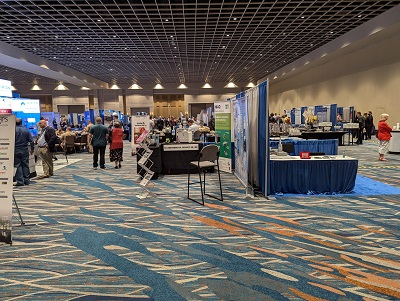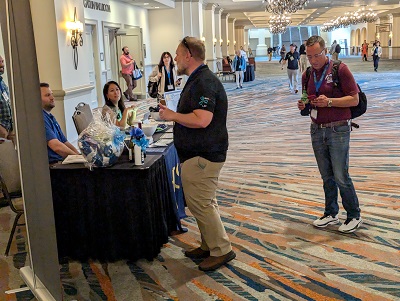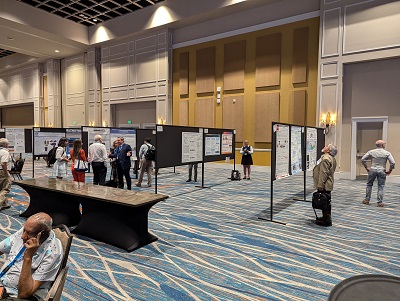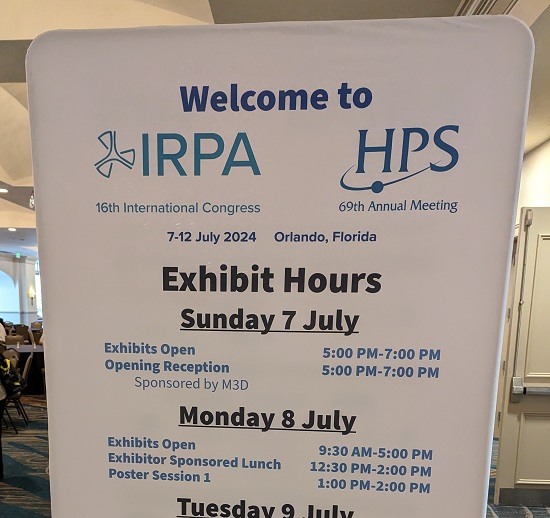G’day, Dr. Zoomie! So…one of my mates is off in the States to a big radiation conference and it made me wonder – what do you guys do at a radiation conference? I’ve been thinking about it and my mind remains boggled.
Wow – so many things go on at these conferences – it’s hard to summarize succinctly. But let me try!
The most obvious part is the sharing of information, mostly in the form of the people giving talks or showing posters about their work and their research. Some of this is original research that adds to the sum of human knowledge, but some of it consists of “lessons learned,” novel solutions to problems that we all face, giving new ways of looking at our work, and more. But the goal is the same in each case – to share hard-won knowledge and experiences with others who are interested. Having said that, there are also more philosophical presentations – mostly given by some of the profession’s “elder statesmen.” These presentations are often the most interesting because it’s a chance to learn how experts with decades of experience have come to view their profession and their work and they can sometimes help the younger professionals see their profession from a different vantage point. But whether they’re talking about the science, the work, or the philosophy, this sort of information exchange is the most obvious and the most popular part of most of these meetings.

A different sort of information exchange comes in the form of short courses or lectures. At this meeting there are lectures on radiation biology, how to train emergency responders in radiation safety, how to practice radiation safety in an emergency when there might be multiple risks, how to handle natural radioactivity, how to run a radiation safety program, communicating science to non-scientists, risk perception and communication, “radiation deception” case studies, and about 50 others. This is a chance to people to try to pick up a new set of skills, to learn about something that might help them to be better at their job, or to simply learn something new. And it’s a good way for board-certified professionals to earn the continuing education credits they need in order to maintain their certification.
One of the places where a lot of people hang out at these meetings is the vendor area – this is where companies that make radiation safety equipment, do consulting, or are otherwise involved in doing business related to radiation safety will set up booths that attendees can visit to learn about the company and their products. But it’s so much more than that! When I was having some customer services problems a while back that just couldn’t be resolved over the phone or via email, I visited the company’s booth at the Health Physics Society (HPS) meeting and was able to talk in person to the folks I was having problems with – we got everything worked out in a few minutes. Another time when I was looking for an instrument with very specific capabilities I stopped at a different booth and was able to find out that nobody made an instrument that did what I wanted – and the company became interested enough that they modified an instrument to be what I (and, as it turned out, a bunch of other people) were looking for. It’s a great place to learn more about instruments, dosimeters, capabilities, regulations, and much more – and I’ve even had a number of manufacturers tell me “We don’t make anything like that – but that company over there does.” Plus, since a lot of people are wandering the exhibition hall, it’s also a great place to look for colleagues and friends.
For students and young professionals, these meetings offer the opportunity of mentorship – spending time with established professionals to learn more about the practice of health physics, to learn how they built their careers, getting the chance to meet some of the leaders of the field, how to apply for grad school, and so forth. I spent a half hour yesterday afternoon talking with some grad students, answering their questions about my work and my career, and sharing stories with them of past experiences – both good and bad – that might be able to help them as they navigate their own careers.

And then there are the business meetings – conferences like this are where much of the business of running a scientific society is done. When I was on the HPS Board of Directors we’d take two full days to meet and to discuss the state of our profession and the HPS, to talk about potential problems, and to develop strategies for addressing those problems. Problems could range from the shrinking number of students studying health physics to finding ways to help the public learn more about radiation to weighing in on proposed regulatory changes, reviewing new guidance documents, collaborating with other scientific societies, discussing whether or not membership dues needed to be raised, and so forth. Scientific societies don’t just happen and they certainly don’t last unless people are willing to do the work to keep them alive and vibrant – much of this work takes place at conferences such as this one. And – I should add – this is true on an international level as well. The meeting your coworker is at is probably the same meeting I’m attending this week – a combined meeting of the Health Physics Society (an American society) and the International Radiation Protection Association. This means that IRPA’s Executive Council is meeting to do the business of IRPA, just as the HPS Board of Directors is doing for our domestic radiation safety community.

Finally – and possibly most importantly – meetings such as this are about the people. I think that, in many respects, the chance to link up with friends and colleagues, to learn about what they’ve been up to, to seek their advice or their help if necessary, and to offer the same advice and help to others – it’s invaluable. Just as valuable is the chance to meet new people, to learn about them and their work, and to simply learn more about all the facets of this unique profession. I’ve been doing radiation safety for over 40 years and I’ve been an HPS member for over 30 and there’s still an awful lot I don’t know and far too many people I have not yet met. I whittle away at my ignorance at meetings such as these, and I’d like to think that we are all better for this opportunity. The scientific program is great – but the social program (planned and unplanned) is just as nice.
So that’s what your mate is likely up to! Oh – and for what it’s worth, there’s a chance to Australia might be hosting an international Congress in 2032 – they’re one of the nations in the running for IRPA 18. So you might be able to see for yourself in a few years.
